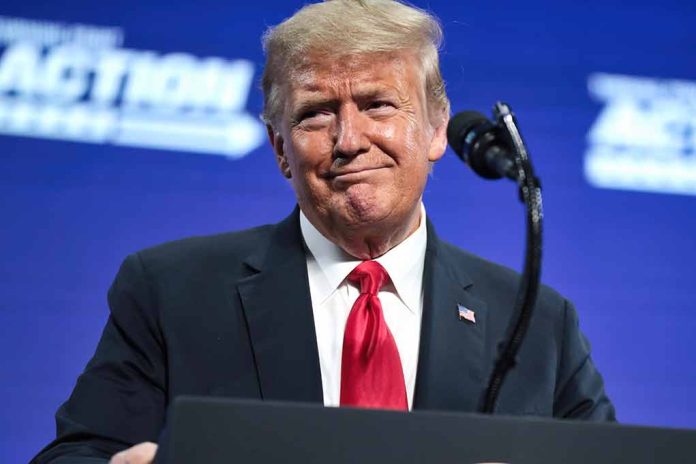
Michael Barr, the Federal Reserve’s top financial regulator, announces his resignation to avoid potential conflicts with the incoming Trump administration.
At a Glance
- Michael Barr will step down as Federal Reserve Vice Chair for Supervision on February 28
- Barr’s resignation aims to prevent legal disputes that could politicize the Federal Reserve
- His departure will pause critical regulatory actions until a successor is appointed
- Barr will remain on the Fed’s Board of Governors until 2032
- The move signals a potential shift in banking regulation under a new administration
Barr’s Departure and Its Implications
Michael Barr, the Federal Reserve’s Vice Chair for Supervision, has announced his resignation effective February 28, or earlier if a successor is confirmed. This decision comes amid speculation about potential conflicts with the incoming Trump administration’s policies. Barr’s early departure is seen as a strategic move to prevent legal disputes that could potentially politicize the Federal Reserve’s activities.
The resignation has significant implications for banking regulation, as it will cause a pause in critical regulatory actions until Barr’s role is filled by a successor. During his tenure, Barr was known for his efforts to enhance the rigor of banking rules, which often led to pushback from the banking industry, political figures, and even some of his colleagues at the Federal Reserve who held differing views on the extent of necessary regulation.
In the wake of Michael Barr’s announcement to resign the position of Vice Chair for Supervision at the Fed, it is now time to amend the Dodd-Frank Act to eliminate altogether the position, which has become politicized and insolated from accountability.
— Congressman Andy Barr (@RepAndyBarr) January 6, 2025
Regulatory Landscape and Political Tensions
Barr’s proposed rules for large U.S. banks to increase financial reserves faced opposition from major financial firms and Senate Republicans. Senator Tim Scott, a vocal critic of Barr’s regulations, expressed his disapproval of Barr’s approach, stating that it was harmful to lending and the economy.
“Michael Barr has failed to meet the responsibilities of his position,” Scott said in a statement. “I stand ready to work with President Trump to ensure we have responsible financial regulators at the helm.” – Sen. Tim Scott
Reports suggested that former President Trump might attempt to fire or demote Barr, although Fed Chair Jerome Powell stated that a president lacks the legal authority to do so. By resigning as vice chair but not as governor, Barr limits the Trump administration’s ability to replace him immediately, as all seven seats on the Fed’s board are currently filled, with the next vacancy not occurring until 2026.
.@SenatorTimScott released the following statement on Michael Barr’s announcement he will step down as the Federal Reserve Board Vice Chair for Supervision: pic.twitter.com/aSaFGl4V4n
— U.S. Senate Banking Committee GOP (@BankingGOP) January 6, 2025
Impact on Banking Regulations
Barr’s departure is expected to have a significant impact on banking regulations. He was a proponent of stricter banking rules, particularly through the Basel III endgame proposal, which mandated larger capital buffers for major US lenders. These reforms would have increased capital requirements for systemically important banks by 21% and potentially raised risk asset weights by 75%.
“If there was any doubt, the 2023 Basel III Endgame proposal is dead” said Brian Gardner.
The banking industry criticized these proposals as too stringent and lacking real-world impact assessments. With Barr’s early exit, major regulatory initiatives are effectively halted, as the Fed has stated it will not pursue significant rulemaking until a new vice chair for supervision is confirmed. This pause in regulatory action is viewed favorably by the banking sector, potentially allowing more capital for stock buybacks, dividends, and lending.
Looking Ahead
As the US anticipates a second Trump administration, Barr’s resignation signals a potential shift in the regulatory landscape, affecting both traditional banking and emerging financial technologies. President-elect Trump can only appoint a current governor to the top regulatory position or wait for a vacancy. Governor Michelle Bowman, a Republican appointee favoring less stringent regulations, is seen as a potential replacement.
“The risk of a dispute over the position could be a distraction from our mission,” Barr said in a statement from the Fed. “In the current environment, I’ve determined that I would be more effective in serving the American people from my role as governor.”
Barr’s decision to step down early avoids a potential legal battle with the Trump administration that could have harmed the central bank’s reputation and independence. While Barr believes he would have won in court, he chose to prioritize the Fed’s mission over personal ambition. As the financial sector awaits the appointment of a new vice chair for supervision, the future direction of banking regulation remains uncertain, with the possibility of a more lenient approach under new leadership.
Sources:
- Top Federal Reserve bank regulator, under fire from GOP, to step down next month | AP News
- Fed’s Top Banking Watchdog, Michael Barr, Steps Down Amid Political Transition – Global Trading
- Fed Vice Chair Says He’s Leaving Role Early to Avoid Fight With Trump – DNyuz



